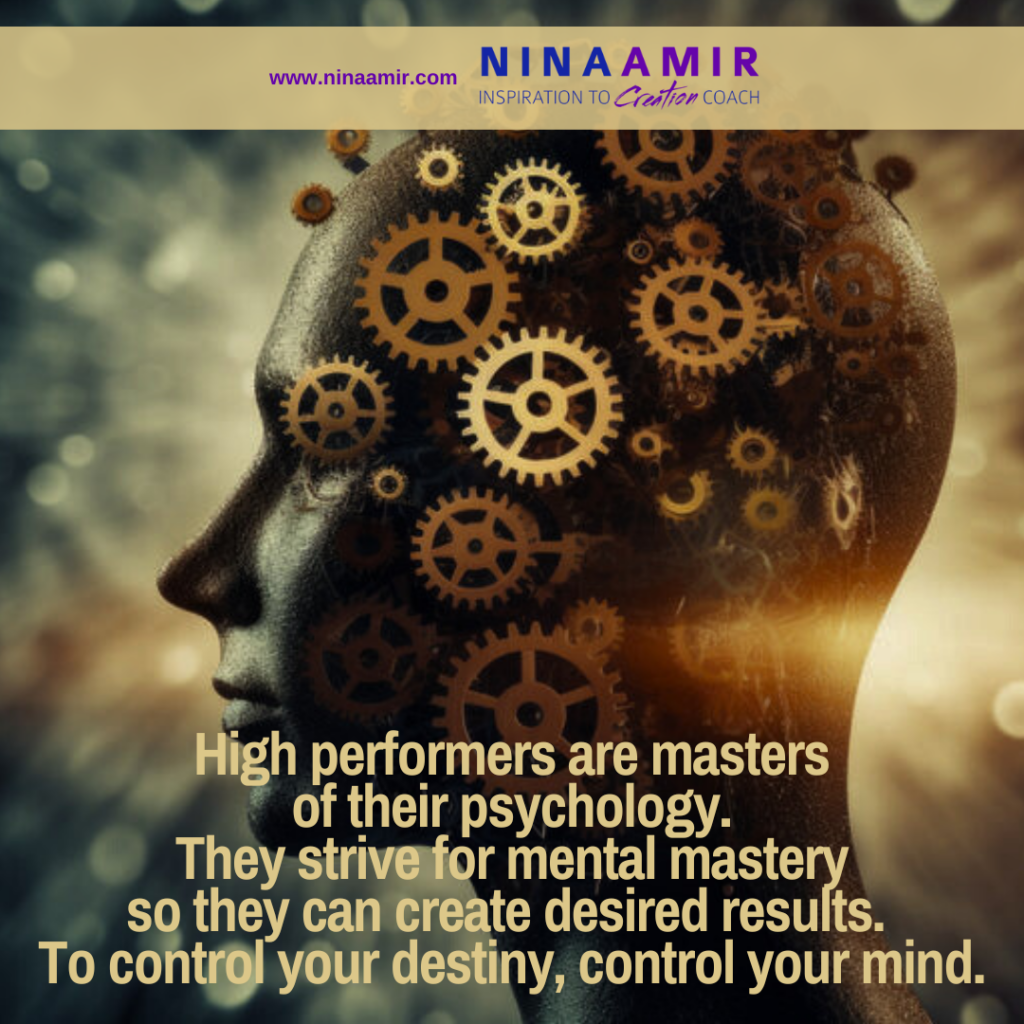
There’s a good reason why the highest-performing people in the world focus on mastering their psychology. Beliefs, thoughts, and words influence your actions, habits, values, and future. If you want to control your destiny, start by controlling your mind.
In Certified High Performance Coaching, we call this “psychology mastery.” Yet, you don’t have to hire or be a Certified High Performance Coach to know the power of mastering your mind.
Many wise teachers have said as much. Consider Rebbe Nachman of Breslov. He said, “You are where your thoughts are, so be careful what you think.”
In the Book of Proverbs (4:23), King Solomon says: “Be careful what you think, because your thoughts run your life.”
The Buddha said, “The mind is everything. What you think you become.”
And Mahatma Gandhi said:
“Your beliefs become your thoughts, Your thoughts become your words, Your words become your actions, Your actions become your habits, Your habits become your values, Your values become your destiny.”
By now, you likely realize that psychology mastery is the key to creating the future of your dreams. But how do you master your mind?
Let’s explore the last quote from Gandhi by breaking it into smaller pieces—six steps. In the process, you will further your understanding of the importance of mental mastery.
1. Your beliefs become your thoughts…
The dictionary defines a belief as “feeling sure that someone or something exists or is true or trustworthy.”
I’ve always said beliefs are thoughts you repeatedly think. The more you think a thought, the more likely you are to believe it. So, I could easily argue that thoughts precede beliefs.
For example, you might tell a little white lie. You repeat it a few times, and before you know it, you consider it true. You form a belief.
Affirmations operate on the same principle. If you think, “I am capable,” many times per day, you eventually believe this statement. And from a neuroscience perspective, you create a new neural pathway in your brain related to this belief.
On the other hand, I could agree with Gandhi. After all, if you hear something and believe it is true, you are likely to think about that belief often. And it will impact all thoughts related to it.
For instance, if you believe the Universe has your back, you will think about this often.
Eventually, you also see proof of this fact. Your brain seeks validation. This “confirmation bias” causes the tendency to look for evidence that confirms a belief.
This is also called the Baader-Meinhof Phenomenon, Recency Bias, or Frequency Illusion. In this case, something you recently learned suddenly seems to appear everywhere. Of course, the more you see your belief operating in the world, the more you think about it, and the deeper your belief becomes.
2. Your thoughts become your words…
Here, again, I could debate which comes first—thoughts or words. After all, thoughts consist of words.
Yet, when you speak your thoughts, you use words. Thus, your beliefs and thoughts are expressed mentally and verbally with words.
For instance, you think, “I can’t do that.” And then, you vocalize that thought in spoken words to yourself or say it aloud to someone.
Some might say feelings elicit thoughts. Thus, you feel something, and your brain translates the feeling into a thought, which is understood via words.
Intuition could be understood this way. Your soul speaks to you through a physical sensation, which becomes a thought about that feeling. Then, you express that intuitive nude with words.
3. Your words become your actions…
Whatever you believe and think, you act upon. Thus, it makes sense that if you express your beliefs and thoughts with words, those words then direct your actions.
If you believe you can’t write a book, for instance, you will think thoughts related to that belief. These might include, “I can’t do that, ” or “I don’t know what to write. I am not a good enough writer. I have no idea how to write a book,” and “I don’t have time to write a book.”
With that type of mental chatter, what’s the likelihood that you take action toward writing a book? Nil, right? After all, why bother. Why try writing a book when you “know” you can’t. (Remember, a belief is something you consider true.)
Let’s reverse that belief. What if you believe you can write a book? Your mental chatter would be quite different. You might hear thoughts like, “I’m a good writer. I can figure out how to write a book. I have a great book idea. I will get published. I am going to become an author.”
As a result, you would likely act in accordance with those beliefs. You would sit at your computer daily and write, would you not?
And think about how other people’s words impact your actions. I didn’t pursue a career as a novelist because my mother discouraged me. Instead, I pursued a career as a magazine journalist when my teachers and mother encouraged me to do so.
A study conducted in 2020 looked at the effects of a sports teacher’s encouraging words to teen players during games. Those played with encouragement from the teacher resulted in increased physical intensity, greater enjoyment, and a more positive mood state among the players.
4. Your actions become your habits…
Habits are formed by consistent and repetitive action. You can have mental and behavioral habits, but in all cases, repeatedly thinking or doing something becomes rote. You do it without thinking, which is the definition of habitual behavior.
For instance, if you continue to think, “I can’t do it,” your brain registers this thought. The more often you think that thought, the deeper the neural pathway in your brain. So, when you think about writing a book (as mentioned above), you automatically say, “I can’t do it.” That’s a thought habit.
But let’s say every time you consider writing a book, you sit down at your computer and begin typing. And you do this every day for a few months. At the end of that period, you will have a writing habit. Writing will simply be what you do daily without fail, just like brushing your teeth.
Look at your life. You will see your habits. Maybe you watch television for an hour each evening or read for 30 minutes before bed. Or you drink a green smoothie every morning or ice cream after dinner each night. These are the actions you take consistently each day without a second thought.
5. Your habits become your values…
Just as your habits become rote, so do your values. By that, I mean you express your values with no conscious intention or effort.
My mentor, Jim Fortin, teaches that we live our values subconsciously. He says, “No one gets up in the morning and says, ‘Hey, what values am I going to operate from today?’ No, our values are unconscious, and they happen on autopilot.”
It makes sense, therefore, that to be, do, and create what you want, you must align your values with the results you seek. Otherwise, you might have a value conflict that makes it more challenging to get the desired results.
If you aren’t sure what you value, look at your habits. If you sit on the couch each night eating ice cream and binge-watching your favorite show, you value this activity. And if you work on your book manuscript each night after dinner for an hour or more, you value this behavior. If you wake up each morning and exercise, you value this activity. If you wake up and scroll social media, that’s the activity you value.
In fact, you created these habits because you value the behavior for some reason. You also are committed to those behaviors, which is why they became habits in the first place.
If you don’t know what you value, look at your life. You’ll see your values clearly.
6. Your values become your destiny…
You could say destiny is something Divinely determined, but we live on the earth plane where action begets results. Thus, what you value impacts what you create.
If you live your values, those values determine your future. You create your destiny through your value-driven actions.
Align your values with the life and results you desire. Align them with the calling of your soul to create the destiny you came here in this lifetime to achieve.
Consider the earlier examples. If you value watching television and eating cookies nightly, what will your future look like or include? Possibly being overweight, out of shape, and stuck in a comfortable but not satisfying life.
On the other hand, if you value contributing to others, you might work on a book nightly. Then, your future will include being an author and impacting the lives of your readers.
If you believe that a power outside yourself—the Divine Creator or Source—determines your destiny, decide now to co-create your future with this power. Align your values with your desired or pre-determined destiny. Then, act upon them accordingly.
And if you believe the power is within you to create your destiny—that you are a creator, do the same. Align your values with your desired future, and then act in a manner that expresses them.
Psychology Mastery Increases Your Ability to Create
You probably realize by now that mastering your psychology—your mind—increases your ability to create your desired future.
Why? Because your beliefs, thoughts, and words govern your actions, habits, and values. Combined, these six things determine who you are being—your identity, what you are doing—your behaviors and actions, and what you are creating—your current and future results—at any given time.
Master your mind—your psychology—and you master your ability to create your future. You become the creator of your destiny.
Do you feel challenged to master your mind, or have you achieved psychology mastery? Tell me in a comment below. And please share this post with a friend or on social media.
Interested in how to change yourself or your life? Let’s chat. Get on my calendar here. Or join the Inspired Creator Community for group personal and spiritual growth coaching every month.
 It’s time to transform, is it not? Join the Inspired Creator Community. As a member, you will discover how to change from the inside out. Finally, be the person who does the things that allow you to create what you desire. Gain access to intuitive transformational coaching, world-class Certified High Performance Coaching, and strategies for living a life that feeds your soul. As you will discover, you are a powerful creator. It’s time to create what you want. Join now!
It’s time to transform, is it not? Join the Inspired Creator Community. As a member, you will discover how to change from the inside out. Finally, be the person who does the things that allow you to create what you desire. Gain access to intuitive transformational coaching, world-class Certified High Performance Coaching, and strategies for living a life that feeds your soul. As you will discover, you are a powerful creator. It’s time to create what you want. Join now!
Photo courtesy of Vladimir Efimov.


